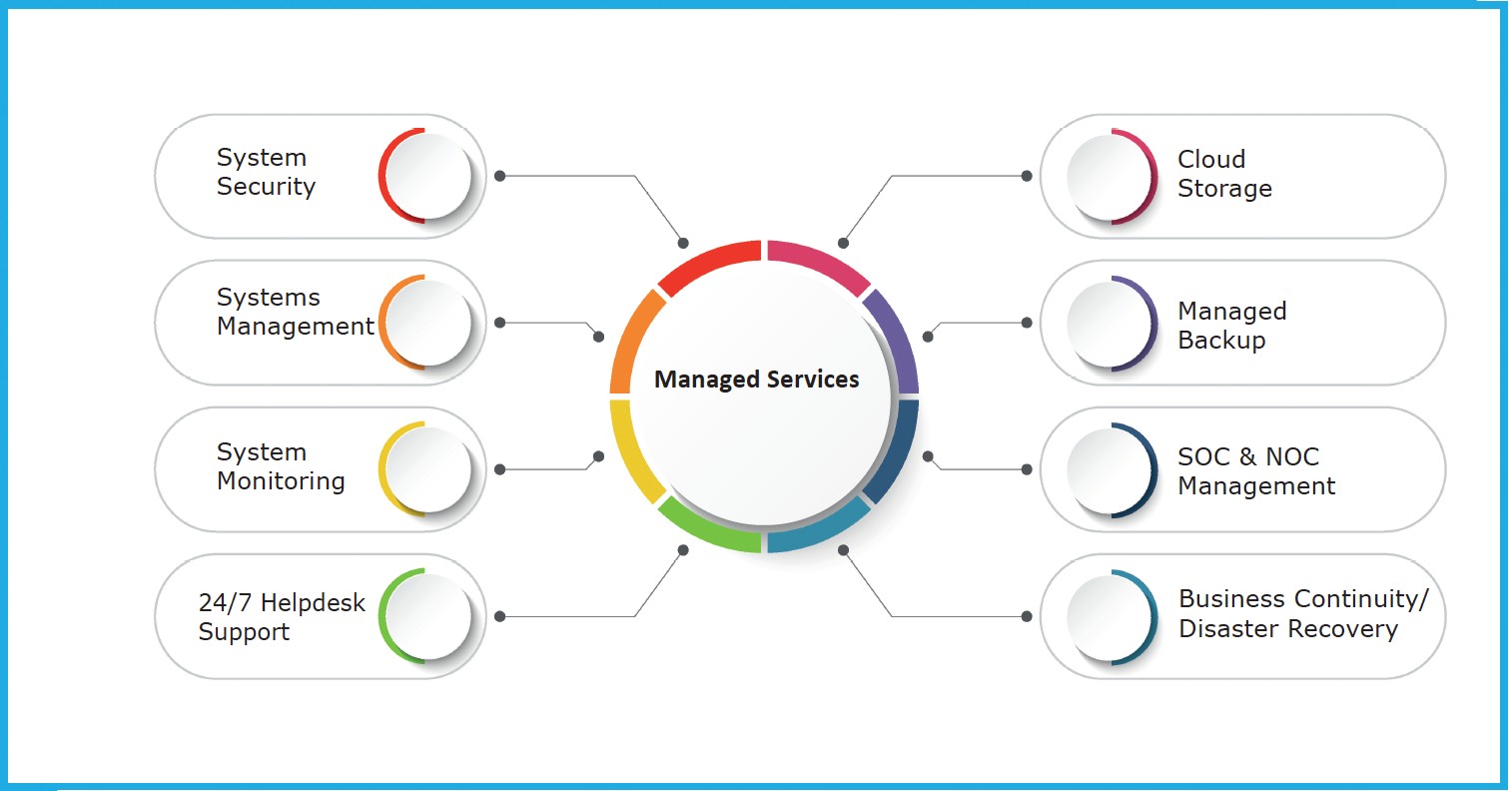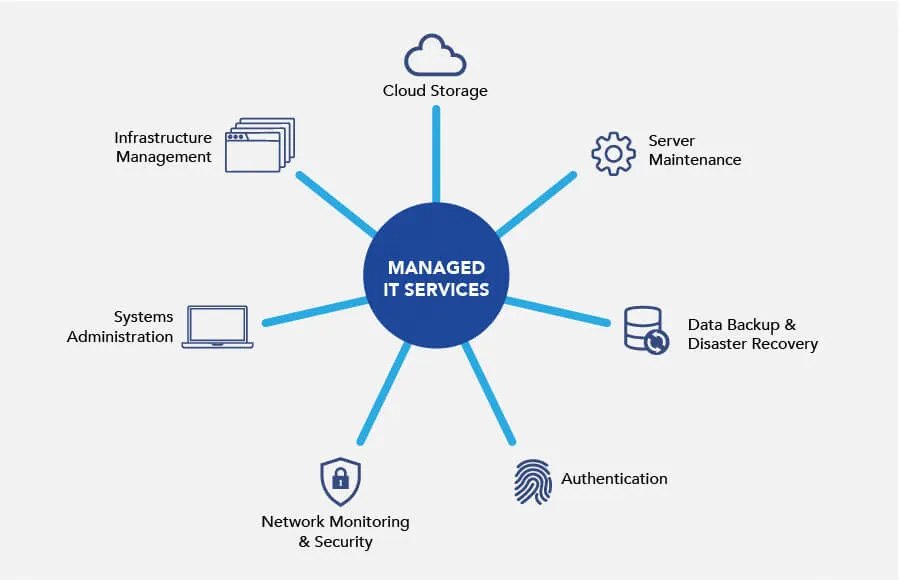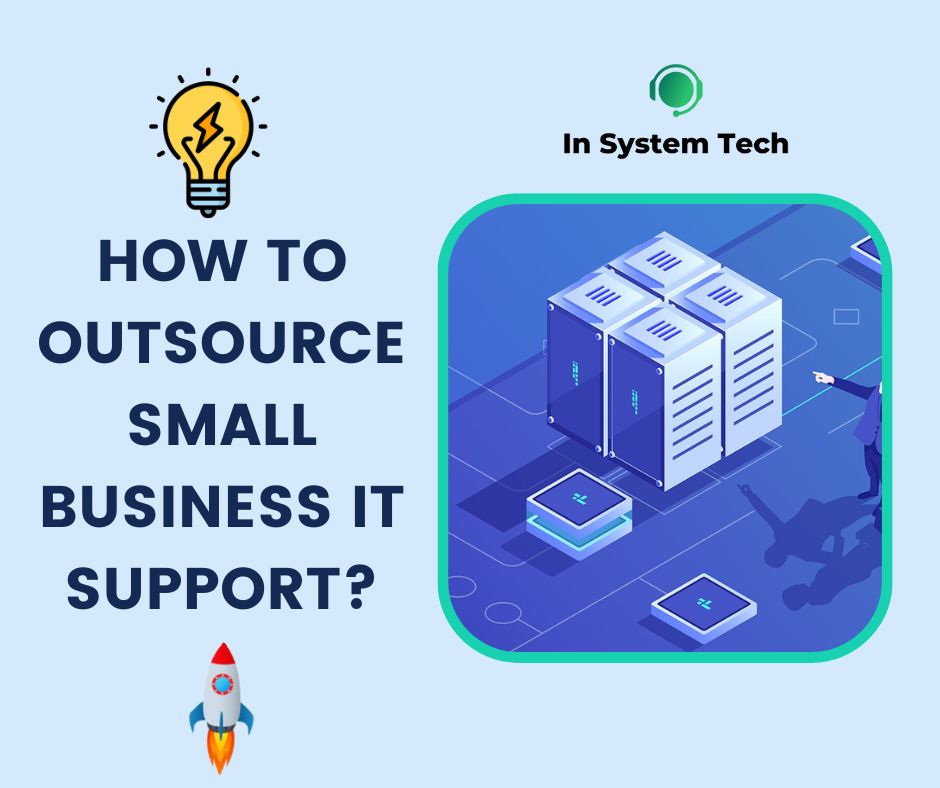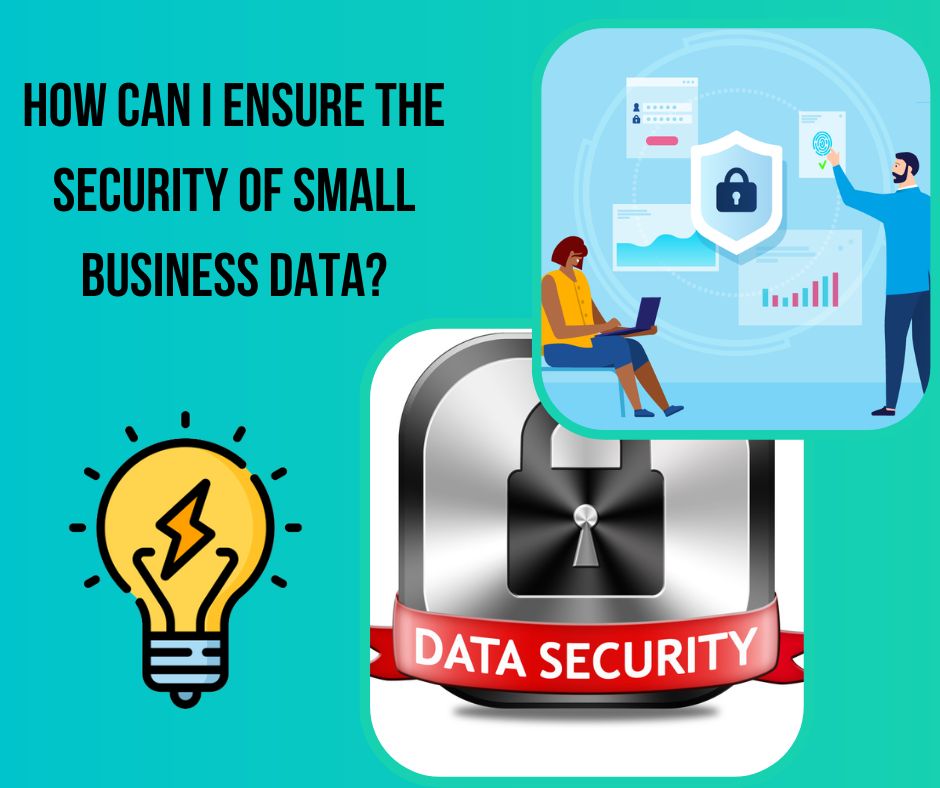Yes, outsourcing IT support for a small business is a common practice and can be a smart decision. By outsourcing your IT support, you can access a team of experts who can manage your technology needs more efficiently and cost-effectively than hiring full-time staff. This is one of the point regarding How to outsource small business IT support.
There are many reputable IT service providers that offer outsourcing services for small businesses. When choosing a provider, it’s important to consider factors such as their experience, reputation, and pricing. You should also look for a provider that can offer customized solutions tailored to your business needs. We can discuss all regarding How to outsource small business IT support.
When outsourcing your IT support, you should also consider the level of control you want to maintain over your technology infrastructure. Some providers offer fully managed services where they take complete responsibility for your IT needs, while others offer a more hands-off approach where you retain more control over your technology. It’s important to discuss your needs and preferences with potential providers to find the best fit for your business.

What are the points I should consider while outsourcing my small business IT support, Now we can discuss all regarding How to outsource small business IT support.
Outsourcing IT support for your small business can be a beneficial decision, but it’s important to consider some key points before choosing a service provider. Here are some factors you should keep in mind:
Experience and expertise:
Look for a service provider with experience working with small businesses and a team of experts who have the necessary skills to manage your technology needs.
here are some additional details about what to look for in terms of experience and expertise when outsourcing IT support for your small business:
Industry-specific knowledge:
Look for a service provider with experience working with small businesses in your industry. This can help ensure that they have a deep understanding of the technology needs and challenges specific to your business.

Technical expertise:
Ensure the provider has a team of skilled professionals who have expertise in managing the types of technology that your business uses. This could include expertise in areas such as networking, cybersecurity, cloud computing, and software development. We can discuss more regarding How to outsource small business IT support.
Proven track record:
Choose a provider with a proven track record of delivering quality IT support to small businesses. Look for testimonials and case studies that demonstrate their ability to provide effective solutions that help businesses operate more efficiently and effectively.
Certifications and qualifications:
Look for a provider with relevant certifications and qualifications, such as CompTIA, Microsoft, Cisco, or other industry-standard certifications. This can provide added assurance that the provider has the knowledge and skills needed to manage your technology needs effectively.

Innovative solutions:
Choose a provider that stays up to date with the latest technology trends and can offer innovative solutions that can help your business stay ahead of the competition. This could include solutions such as artificial intelligence, machine learning, and automation.
By choosing a provider with the right experience and expertise, you can ensure that your IT support needs are in good hands, and that your business can operate smoothly and efficiently. We can discuss few all points regarding How to outsource small business IT support.
Service level agreements (SLAs):
Ensure the service provider offers clear SLAs that specify the level of support you can expect, including response times, uptime guarantees, and other metrics that measure performance.
Certainly, here’s some additional information about what to look for in Service Level Agreements (SLAs) when outsourcing IT support for your small business:
Response times:
Ensure that the SLA specifies the maximum response time for different types of support requests, such as critical, high-priority, and low-priority requests. The response time should be reasonable and within a timeframe that meets your business needs.
Uptime guarantees:
Look for an SLA that specifies the minimum uptime guarantee for your technology infrastructure, such as your website, email system, or network. The uptime guarantee should be high enough to meet your business needs and should include provisions for compensation in case of downtime.
Performance metrics:
Ensure that the SLA includes metrics that measure the provider’s performance, such as the number of support requests resolved within a certain timeframe, the average resolution time, and customer satisfaction ratings.

Escalation procedures:
Ensure that the SLA specifies the escalation procedures for issues that cannot be resolved within the specified timeframe. This should include provisions for escalation to higher-level support staff or management.
Reporting:
Ensure that the SLA includes provisions for regular reporting on the provider’s performance and the status of your technology infrastructure. This can help you stay informed about how your IT support needs are being addressed and can help identify areas for improvement.
Change management:
Ensure that the SLA includes provisions for change management, such as procedures for making changes to your technology infrastructure, testing, and roll-out plans.
Termination clauses:
Ensure that the SLA includes provisions for termination of the agreement, including conditions under which either party can terminate the agreement and the notice period required.
By ensuring that the SLA includes these key provisions, you can ensure that your IT support needs are being addressed effectively and that you have clear expectations for the level of service you can expect.
Security and data protection:
Make sure the provider has strong security measures in place to protect your data and systems from threats such as cyber-attacks, data breaches, and system failures.
Here’s some additional information about what to look for in terms of security and data protection when outsourcing IT support for your small business:
Data encryption:
Ensure that the service provider uses strong encryption protocols to protect your data, both in transit and at rest. Encryption should be used for sensitive data such as customer information, financial data, and intellectual property.
Network security:
Look for a service provider that uses industry-standard security measures to protect your network from threats such as malware, viruses, and phishing attacks. This can include firewalls, intrusion detection and prevention systems, and regular security updates and patching. We can see more things How to outsource small business IT support.
Access control:
Ensure that the service provider has strict access control policies in place to limit access to your data and systems only to authorized personnel. This can include policies such as two-factor authentication, password policies, and access controls based on role-based permissions. Some more points We can discuss here about How to outsource small business IT support.
Data backup and recovery:
Look for a service provider that has robust data backup and recovery processes in place to ensure that your data is protected in the event of a disaster, such as a cyber-attack or system failure. This should include regular backups, offsite storage, and recovery plans that are regularly tested.

Compliance:
Ensure that the service provider has a clear understanding of the compliance requirements that apply to your business, such as HIPAA, GDPR, or PCI-DSS, and can provide solutions that meet these requirements.
Employee training:
Look for a service provider that provides regular training to its employees on cybersecurity best practices, such as identifying phishing attacks and preventing data breaches. This can help ensure that your data is protected not only by technology but also by knowledgeable and vigilant employees.
Incident response:
Ensure that the service provider has clear incident response procedures in place in the event of a security breach or other cybersecurity incident. This should include procedures for notification, containment, investigation, and remediation.
By ensuring that the service provider has strong security and data protection measures in place, you can help protect your business from cybersecurity threats and ensure that your data is protected and available when you need it.
Customized solutions:
Choose a provider that can offer tailored solutions that meet the specific needs of your business. This could include a mix of services, such as network monitoring, data backup and recovery, and help desk support. We can get all points regarding How to outsource small business IT support.
here’s some additional information about what to look for in terms of customized solutions when outsourcing IT support for your small business:
Needs assessment:
Look for a service provider that starts with a needs assessment to determine your business’s unique IT support needs. This should include an analysis of your current infrastructure, software applications, and business processes.
Customization:
Ensure that the service provider can customize its solutions to meet your business’s specific needs. This may include customizing software applications, creating tailored support plans, or designing custom integrations between different systems.
Scalability:
Ensure that the service provider can provide solutions that can grow and scale as your business grows. This may include adding new users, applications, or services, or expanding your infrastructure to accommodate growth.
Flexibility:
Look for a service provider that is flexible in its approach and can provide solutions that adapt to changing business needs. This may include adjusting support levels based on workload or providing new solutions as new business requirements arise.
Collaboration:
Ensure that the service provider works closely with your business to develop customized solutions that meet your needs. This may include regular communication, feedback, and collaboration to ensure that solutions are meeting your business objectives. Know more regarding How to outsource small business IT support.
By ensuring that the service provider can provide customized solutions that meet your business’s unique needs, you can help ensure that your IT support needs are being addressed effectively and efficiently. This can help your business operate more smoothly and effectively, and can help you stay ahead of the competition. See some points more How to outsource small business IT support.
Cost:
Consider the pricing structure of the provider and ensure that it fits within your budget. Look for providers that offer transparent pricing and no hidden fees.
here’s some additional information about what to look for in terms of cost when outsourcing IT support for your small business:
Cost structure:
Look for a service provider that has a transparent and straightforward cost structure. This should include clear pricing for different levels of support, as well as any additional fees or charges that may apply.
Value for money:
Ensure that the service provider offers good value for money, taking into account the level of support provided, the quality of service, and the overall cost. This may require comparing different service providers to determine which offers the best value for your business.
Contract terms:
Ensure that the contract terms are clear and easy to understand, including any commitments you are required to make, any fees or penalties for early termination, and any guarantees or service level agreements (SLAs) that are included.
Scalability:
Look for a service provider that can provide scalable solutions that can grow and adapt as your business grows. This can help you avoid paying for services that you don’t need, or paying for upgrades that you can’t afford.
Hidden costs:
Be aware of any hidden costs or fees that may be included in the contract, such as fees for additional support, upgrades, or hardware. Ensure that these costs are clearly outlined in the contract and that you understand what you are paying for.

By ensuring that you understand the cost structure and value for money of different service providers, you can help ensure that you are getting the best possible IT support for your business at a price that you can afford. This can help you stay within your budget and avoid unexpected costs or fees that can impact your bottom line. We can explain regarding How to outsource small business IT support.
Communication and support:
Choose a provider that offers clear communication channels and provides responsive support when you need it. You should also ensure that they provide training and support for your staff to use the technology effectively.
Here’s some additional information about what to look for in terms of communication and support when outsourcing IT support for your small business:
Communication channels:
Ensure that the service provider offers a variety of communication channels, including phone, email, chat, and ticketing systems. This can help you get support quickly and easily, and can help ensure that you can reach the support team in case of an emergency.
Read More:
| What IT services are essential for a small business? |
| How much does small business IT support typically cost? |
| How do I choose the right IT support provider for my small business? |
Response time:
Look for a service provider that offers fast response times, especially for critical issues. This may include guarantees or SLAs that specify how quickly the support team will respond to different types of issues. We can some more regarding How to outsource small business IT support.
Availability:
Ensure that the service provider offers support during the hours when you need it, especially if you operate outside of standard business hours. This may require finding a service provider that offers 24/7 support or extended support hours.
Technical expertise:
Ensure that the support team has the technical expertise required to address your business’s specific IT support needs. This may require finding a service provider that specializes in your industry or has experience working with similar businesses.
Proactive support:
Look for a service provider that offers proactive support, such as regular system updates and maintenance, to help prevent issues before they occur. This can help reduce downtime and ensure that your systems are operating at peak performance.
By ensuring that the service provider offers effective communication and support, you can help ensure that your business’s IT support needs are being addressed quickly and efficiently. This can help you minimize downtime, reduce the risk of data loss or other IT issues, and keep your business running smoothly. We can see more regarding How to outsource small business IT support.
Scalability:
Consider a provider that can grow with your business and offer scalable solutions that can adapt to your changing needs.
By considering these factors, you can choose an IT support provider that can help your small business succeed and thrive.
here’s some additional information about what to look for in terms of scalability when outsourcing IT support for your small business:

Infrastructure:
Ensure that the service provider has the infrastructure and resources required to support your business as it grows. This may include sufficient server capacity, bandwidth, and storage space to accommodate increased usage or data volume.
Staffing:
Look for a service provider that has sufficient staffing to support your business as it grows. This may require finding a service provider that can quickly add staff or resources as your needs change.
Service levels:
Ensure that the service provider can offer flexible service levels that can adapt to changing business needs. This may include offering different levels of support for different users or departments, or providing additional support during peak usage periods.
Customization:
Look for a service provider that can customize its solutions to meet your business’s changing needs. This may include creating custom integrations or software applications, or developing new solutions as your business evolves.
Scalable pricing:
Ensure that the service provider offers scalable pricing that can grow and adapt as your business grows. This may require finding a service provider that offers flexible pricing plans, such as pay-per-user or pay-as-you-go plans. We can think some more regarding How to outsource small business IT support.
By ensuring that the service provider can offer scalable solutions that can adapt to your business’s changing needs, you can help ensure that your IT support needs are being addressed effectively and efficiently. This can help your business operate more smoothly and effectively, and can help you stay ahead of the competition. We can discuss all the things regrading How to outsource small business IT support.
Outsource small business IT support For Your Business In USA.
Call the IT Support Guys at www.insystemtech.com right away if your small business needs its computers to work better. We can help you get the most out of your tools by giving you desktop help and other IT services. Call +18885065226 right away to talk to a pro.
IT Support Guys right away if your small business or home needs
Website: https://tinyurl.com/ycyh6xnd
Address: Address: 1201 West Esplanade Ave Apt. 303,LA, Kenner,United States 70065
CAll: +1 888 506 5226
Conclusions
In conclusion, outsourcing IT support for your small business can be a cost-effective and efficient way to ensure that your business’s IT needs are being addressed effectively.
However, there are several key factors to consider when choosing a service provider, including experience and expertise, service level agreements, security and data protection, customized solutions, communication and support, scalability, and cost. By carefully evaluating these factors, you can choose a service provider that meets your business’s unique needs and helps ensure that your IT infrastructure operates efficiently and effectively, now and in the future.


